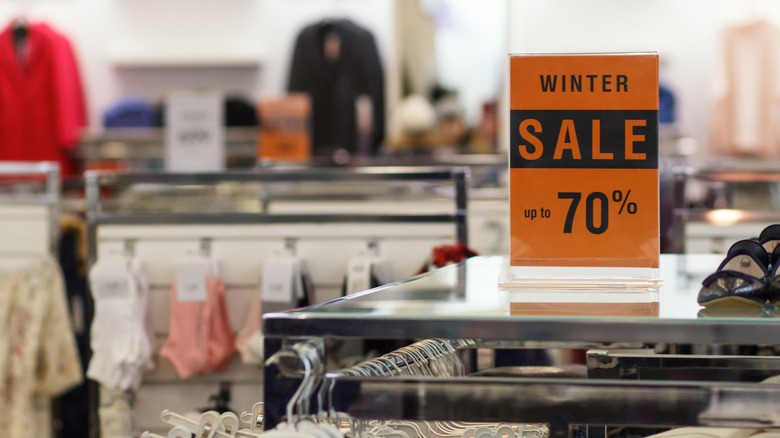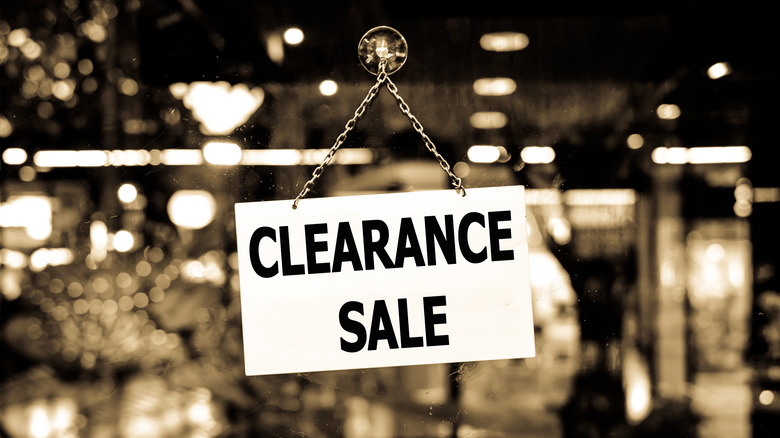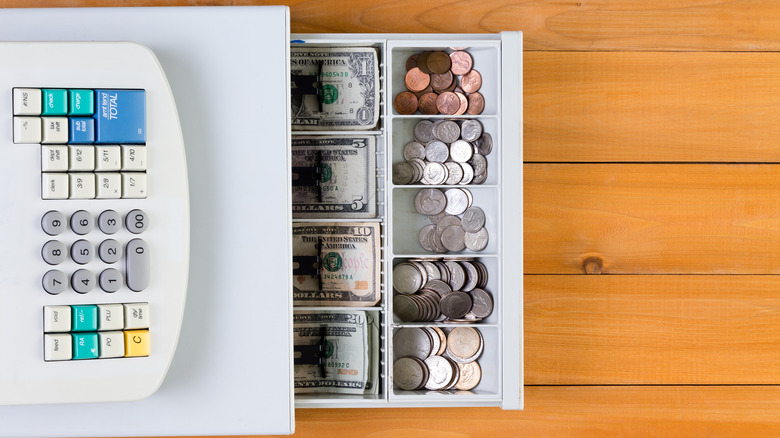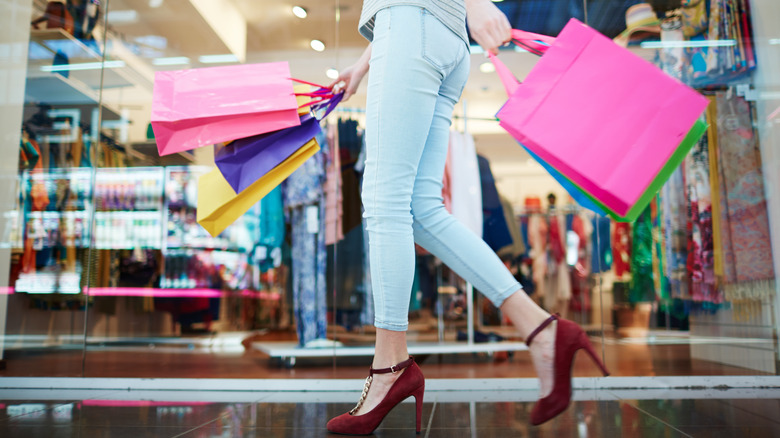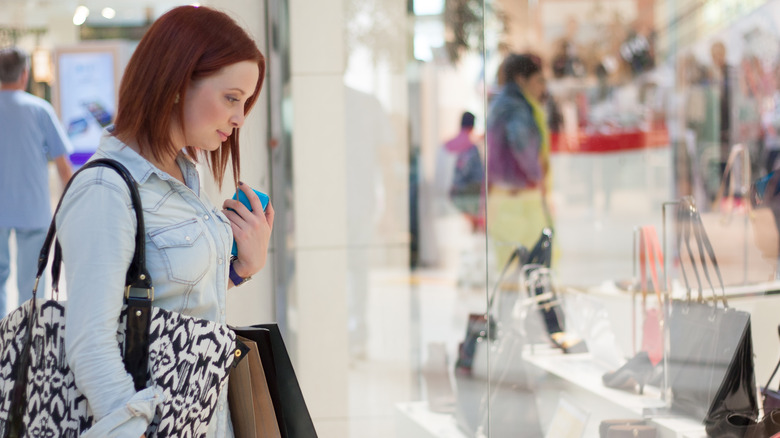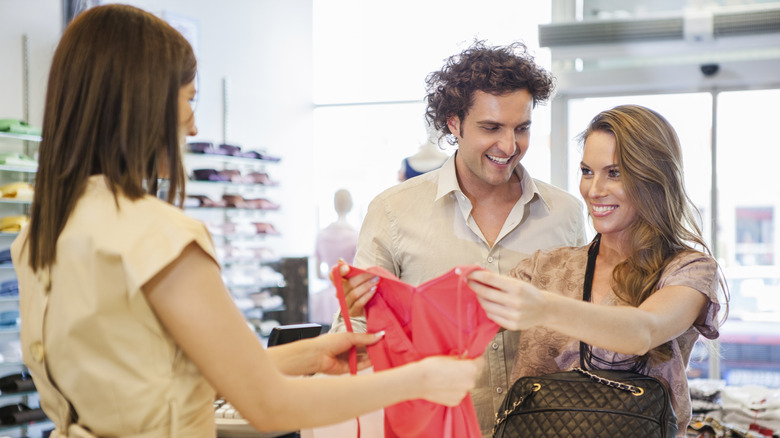Ways Clothes Stores Are Secretly Scamming You
I'll admit it, I'm a marketer's dream. I'm a sucker for a deal, and I'm easily convinced that I can't live without a certain featured product. That's why it's so important for me to watch out for ways that clothing stores could be scamming me.
It's pretty amazing how retail stores play into our human psychology without us ever realizing. From misleading discounts, to heavenly scents, clothing stores know what they're doing. Next time you're heading out for a shopping spree, be prepared for some of these scams.
Misleading discounts
If you're the type of person who loves a sale, pay close attention to the discount before loading up. Many stores mark up their clothes, only to "discount" them a few days later. "Clothing stores like to play fast and loose with 'original' prices, so they can advertise misleading discounts," features editor with DealNews, Benjamin Glaser, told me. "They'll increase the price one day, then offer a 'discount' that brings the price back down to what's really just the normal level. Or, they will use unrealistically high manufacturer suggested retail prices (MSRPs) to do the same thing."
If you find it difficult to avoid the sale rack, I feel you. We all love knowing that we got the best deal. To be sure you're getting the most value for your dollar, check out the store's prices online before shopping. "Instead of taking a store's word, check online to see what that same item costs elsewhere," recommended Glaser. "Check DealNews, where we'll tell you how much our discounted items normally cost. If the item you're buying is on Amazon, you can use the website CamelCamelCamel to see how its price has fluctuated over the last few months."
Discounts without actual products
Stores may also try to lure you in with crazy discounts, but once you're there, it's nearly impossible to actually purchase the item. They may only have a few available, or there may be too many restrictions. In 2014, Costco had to settle a lawsuit with Michael Kors, because the store was advertising crazy low prices on their handbags, but only had a couple available for purchase.
Remember that you have other options, even when you see those major discounts. "While shopping for clothes at your favorite store, watch out for sale and clearance signs," Ashley Eneriz, expert finance writer, told me. "We have been trained to think that the word sale or clearance means 'great deal' or that we are saving money, but it is important to take a closer look at the actual savings. A tank top at a trendy store could be 50 percent off, yet still five dollars more expensive than your local Target."
Mind games
One trick that clothing stores use to get you to buy is by appealing to your sense of scarcity. By making it look like a certain item is running out, you can't help but want it more. "Clothing stores are masters at getting you to buy extra items once you're in-store or on their site," Glaser told me. "They know exactly which items will appeal to you, and often create false senses of urgency or scarcity to close the deal."
If you find yourself feeling like you need to buy that sweater because it's about to sell out, take a deep breath and do a quick reality check. "So don't commit to buying something until you've done some research, and you know what you want and how much it should cost. Then, stick to your shopping list," recommended Glaser. "If the store offers you an add-on that seems like a good deal, but wasn't something you'd thought about buying, think twice. There's probably a reason it wasn't on your shopping list."
Store credit cards
It would be hard to think of a clothing store that doesn't offer its own credit card. Every time you shop, the sales associate surprises you with the unbelievable savings you'll get once you open the card. However, it comes at a price.
"Be wary of store credit cards. They often offer attractive discounts, but come with sky high interest rates, and are issued to users with bad credit," warned Glaser. "Plus, you might then feel obligated to shop at that store, instead of shopping around for the best price. You're probably better off getting a good rewards card you can use anywhere."
If it sounds too good to be true...
Have you seen those ads in the corner of your computer screen for unbelievable deals? Cute swimsuits for $12 or an entire outfit for less than $20? They always look trendy and fun, but don't be fooled. Do you really think you could get a quality bathing suit for $12?
Communications director for BeenVerified Justin Lavelle told Woman's Day that those ads are not to be trusted. "There are many overseas clothing companies today offering [what they advertise as] gorgeous and trendy clothes for next to nothing," he said. "They show images of the clothes on models that look amazing. But what you see on their site and what you get are usually two different things — cheap fabrics, unrealistic sizing, and impossible returns and refunds."
One way to protect yourself from these tempting deals is to read the reviews. "Most sites that look too good to be true, are. If you are tempted by the cute fashions and low prices, be sure to do a search for reviews for the store first," recommended Eneriz. "Also, never shop for anything online, either legitimate sites or the questionable sites, with a debit card. Use a credit card that will allow you to dispute fraud charges."
It's not just the stores ripping you off
Next time you go clothes shopping, know that you'll be paying for another scam, but this one's not the store's fault. Theft and return fraud take huge chunks out of retail stores' budgets, and those losses get passed on to the consumers. "Certainly there's a loss of tax revenue," Robert Moraca, vice president of loss prevention at the National Retail Federation, told the Chicago Tribune. "And every item stolen has to be replaced, and that's passed on to the consumer." Theft and other dishonest shopping practices have cost retailers up to $44 billion per year!
There are plenty of ways that thieves cheat the system. They may steal an item and later try to return it for cash, or some buy an expensive dress for a special occasion, then return it. Buying expensive outfits for an event, then turning around and returning it even has a name. It's called "wardrobing," and 72 percent of retailers experience it. "The criminal creativity is seemingly endless and mind-boggling," Rob Karr, CEO of the Illinois Retail Merchants Association, told the Chicago Tribune.
Sharing your data
We've all heard the horror stories involving identity theft, and they often start with online shopping. "Retailing involves more and more digital technology, and as consumers we leave more data footprints, both online and offline," Denise Dahlhoff, research director at Wharton's Baker Retailing Center, said in a university publication, "Data is collected at all stages of the shopping process — from browsing and buying online, opting into mobile ads at a store, posting store check-ins and reviews on social media, to paying with a credit card or mobile wallet. More technology and data have many benefits for consumers and retailers, but they also increase the risk of security breaches." That's not to say you should never shop online. What would you do during the holidays? However, just be careful, and if something doesn't feel right, don't enter your information.
"Retailers have been caught out by bad data architecture. You should never store sensitive information on a network that third-party vendors have access to," Christopher Yoo, professor of law, communication, and computer and information science at the University of Pennsylvania Law School, also said in the school publication. "Create a systematic classification categorizing what's sensitive and what's not."
They get you at the register
Have you ever noticed all those little deals at the register? I was surprised to go to Old Navy recently and see little toys and candies while I waited in line. "Who goes to Old Navy for candy?" I thought to myself. Well, the answer is no one, but that doesn't mean it's not part of their strategy.
These little deals at the register are called "open-the-wallet" items and are designed to ease you into spending. "Americans are cautious," consultant Jeff Green told Reader's Digest. By offering you something small to buy, it opens you up to spending more.
They appeal to all of your senses
When you walk into a store, you probably notice the bright colors and easy layout. But you may not notice all of the other details that retailers have carefully designed for you. Stores use signature scents to put you in a good mood and make you more likely to buy. Clothing stores often use certain perfumes to affect your mood. Researcher Martin Lindstrom told Reader's Digest that he started adding the smell of fresh apple pie to an appliance store and sales went up!
Next, start listening to the store's music. It is designed to be slower than your heartbeat, which naturally slows you down. Once you start walking more slowly, you'll spend more time in the store and, according to Reader's Digest, even buy up to 29 percent more!
No such thing as a free gift
Most of us feel pretty confident when turning down a sales associate's upsell. When walking into the GAP for a pair of pants, I know that the salesperson is also going to offer me the matching belt and shoes. That's an easy no, but stores have caught on and are adjusting their strategies.
Here's how it goes down: if that same store marks up that pair of pants and then includes the belt and shoes as a free gift, now we're talking! CEO of OfferCraf, Aron Ezra, told Business Insider that this new policy of marking up items and including a free gift is much more enticing for us. Rather than turning down a sale, we're now faced with turning down a free gift.
Rude sales people
This was a shocking finding for me. I've always thought that sales associates had to be as friendly as possible, but it turns out the rude ones might sell more. A study from the University of British Columbia found that shoppers who dealt with a rude salesperson were more likely to buy. This technique only worked with designer labels, and researchers believe that when a salesperson acts snobby, we subconsciously want to feel accepted and like we belong is this luxury store.
"It appears that snobbiness might actually be a qualification worth considering for luxury brands like Louis Vuitton or Gucci," Sauder Marketing professor Darren Dahl said. "Our research indicates they can end up having a similar effect to an 'in-group' in high school that others aspire to join."
So next time you're passing through a Gucci store and it feels like the associate is looking down on you, just walk out.
Physical touch
Acting like a snob is not the only way that sales associates make a sale. A study in Psychological Science found that you're more likely to spend more money if the salesperson physically touches you, like putting her hand on your shoulder. It should be noted that this only seems to happen with female sales associates, but both men and women follow this same pattern. Authors found that physical touch made shoppers feel more secure and connected to the salesperson.
Who is at risk?
Truly, we're all at risk of retail scams, but some more than others. According to AARP, studies have shown that older Americans are more at risk for scams. Americans over age 50 make up just 34 percent of our population, but account for 55 percent of fraud victims.
How to protect yourself
An easy way to protect yourself is to always do your homework before shopping. First, know the store's return policy. "When it comes to buying clothes online, stick with stores you know and ones that have buyer-friendly return policies," recommended Eneriz. For example, Amazon features some vendors with crazy good deals, but their return policies make the purchase not worth it.
"When you purchase online just check out the return policy," Holly Weidman of Mrs Savvy Saver told me. "This should tell your right away if your return would go to a US address or not. US based companies cost less for returns versus a company from China, which would have international fees for shipping."
And always double-check the discounts. "If your favorite store has a scanner, like Kohl's or Target, be sure to scan clearance rack items to see if they are at a bigger discount," recommended Eneriz. "One time, a pair of jeans at Target had a clearance sticker for $19.99 on them, but they actually ended up being less than eight dollars." Shop smart, and you won't fall for any of these scams!

